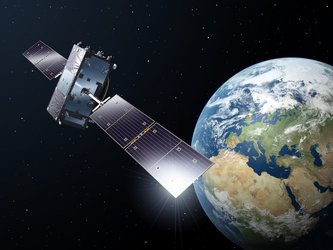Galileo satellites seated atop Soyuz launcher
Europe’s latest two Galileo satellites have been placed on top of their Soyuz launcher, ready for their ride to orbit tomorrow.
The afternoon of 19 August saw the transport of the fifth and sixth satellites of the Galileo constellation to the Soyuz launch complex, having previously been attached together by dispenser, then placed atop their Fregat upper stage and finally enclosed within their protective launch fairing.
Once this combined ‘upper composite’ – comprising the two satellites, their dispenser and upper stage plus the launch fairing surrounding them – reached the launch complex it was hoisted up the mobile gantry surrounding the waiting three-stage Soyuz launcher.
The launch team worked into the night to integrate the upper composite on top of the other three Soyuz stages, completing the launcher.

Next comes the final checkout, followed by fuelling. The final countdown is scheduled to end in launcher liftoff on Thursday, 21 August at 14:31:14 CEST (12:31:14 UTC).
At three hours, 47 minutes and 57 seconds after liftoff, the satellites will then be deployed from their Fregat by the dispenser’s pyrotechnic separation system once their final 23 500 km altitude is reached.

These new satellites will join four Galileo satellites already in orbit, launched in October 2011 and October 2012 respectively.
This first quartet were ‘In-Orbit Validation’ satellites, serving to demonstrate the Galileo system would function as planned.
Now that work has been done, the ‘Full Operational Capability’ satellites being launched this week are significant as the first of the rest of the Galileo constellation.
The payloads generating navigation signals to Earth have been manufactured by Surrey Satellite Technology Ltd in the UK, while the satellites carrying them have been built by OHB in Germany.
A steady stream of launches is planned for the next few years, with two Galileo satellites flown per Soyuz launch and four Galileo satellites flown per launch of an Ariane 5 variant currently in preparation.

Galileo partners
The definition, development and In-Orbit Validation phases of the Galileo programme were carried out by ESA and co-funded by ESA and the EU.
The Full Operational Capability phase is managed and fully funded by the European Commission. The Commission and ESA have signed a delegation agreement by which ESA acts as design and procurement agent on behalf of the Commission.





